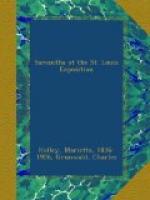I hated such oncongenial idees. But couldn’t deny they wuz spooney, for they wuz, not a small teaspoon but a big silver dinner spoon, and I believe it will last. Not the outward form of the spoon, oh, no, that would be too wearisome to the world and themselves, but the precious metal that forms it. Love is the greatest thing in the world.
Blandina had always lived in a back place and had never heard a graphophone, so bein’ kinder tired, and bein’ nigh a place where they had one, we went in at her request and sot for quite a spell.
And we heard voices and songs gay and sad, marches and melodies, loftiest oratory, maddest mirth and profoundest feeling all comin’ out of a little square box, what a idee!
What a man that Edison is. It seems always like watchin’ the wonderful onseen secrets of nater, like seein’ the mortal made immortal to think that voices we’ve loved and mourned as they wuz hushed in the last stillness can sound out agin, breakin’ our hearts with the same old echoes, the same old sweetness of the voice we loved and lost, talkin’ in mortal words and axents to us when they’ve long, long ago learnt the immortal language, beheld the immortal seens.
Why Cleopatra’s voice might have been stored up as she made love to Antony, or the voice of the relation on her own side, old Mr. Pharo himself orderin’ the Hebrews to git out of his premises, and their back talk about plaguin’ him till he wuz willin’ they should go.
Why even Eve scoldin’ Adam about slackness in gittin’ kindlin’ wood or her pardner complainin’ about her wastefulness and extravagance in usin’ so many fig leaves for her fall suit. Oh, how nateral, how nateral that would sound to wimmen.
Or old Noah’s voice as he stood in the Ark door bagonin and shoutin’ to the animals to walk in male and female. Or his voice kinder soothin’ and patronizin’ tellin’ the female dove to go out and shirk round on the water and see if it wuz safe for the males in the party to go out. Oh, how nateral that would sound to wimmen, soundin’ out through the centuries.
And on and on down the long years, Job’s voice complainin’ of the bitter comfort of his friend’s familiar talk. He’d stood losin’ family and fortune and had stood biles but the seven days’ visitation and the “I told-you-sos” and the advice of well wishers wuz too much for him.
And Solomon’s talk to Miss Sheba and hem to him. And Daniel’s talk by the deep waters, and mebby the Great Voice that said to him:
“Understand!”
And brave Queen Esther’s voice facin’ her enemies and a drunken king, and sweet Ruth’s, and Paul’s incomparable words, and St. John’s. Or the lofty voices of the Patriot fathers as they nobly shrieked for freedom as they threw their pardner’s tea overboard, while they hung onto their whiskey and tobacco that wuz taxed twice as high.
Oh, how their impassioned cries for liberty, and how they would willin’ly sacrifice their wives favorite beveridge ruther than to yield to the tyrant. How nateral, how nateral them noble yells would sound to their descendant females, the Daughters of the Revolution, and all the rest. What would it be for us all to hear them axents, and it could have been done if Edison had been born sooner and that little box had been round.




